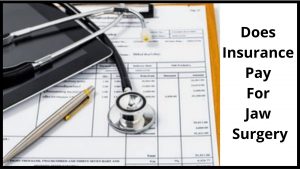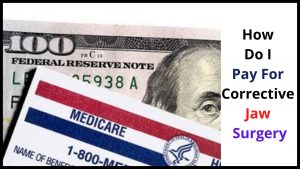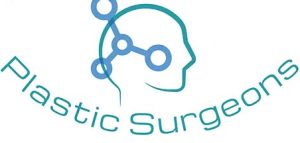
On average it cost between $6,500 to $56,500.
This will be depending on the scope of surgery and the practitioner.
And this surgery will most likely be covered by your health insurance company, depending on the coverage details of your policy.
But, it may not be covered by insurance if it is done only for cosmetic reasons.
Generally, most insurance companies don’t pay for any procedures outside of those which directly benefit the patient.
Most orthodontic surgeons will agree to bill their patients for the entire cost of the procedure.
Jaw Reduction Surgery Cost – How much is jaw reduction surgery?
Jaw Alignment Surgery costs depend on a variety of factors.
Of course, you have to consider the exact procedure you’re interested in, your overall health, and your budget.
Some people don’t even bother to ask how much a jaw-reduction surgery will cost before they undergo the procedure.
The reason for this is that most people simply set a fixed price and go with it.
The best way to find out how much a jaw-alignment surgery will cost is to understand how the process works and why you should take it if you have an option.
First of all, when you choose to have jaw-reduction surgery, you should ask about the total cost upfront.
This includes not only the procedure itself but post-operation care as well.
Sometimes, this is included in the initial price of the treatment, other times it’s an additional charge that you must pay.
The reason for doing this is so that you know what you will ultimately be paying for, which will ultimately help you make an informed decision.
The second factor that goes into the equation is the surgeon you choose.
There are basically two types of surgeons: those who perform just general facial liposuction and those who perform jaw shaving.
For both procedures, the prices will vary quite a bit, so it’s important to know the difference before you get started.
When you compare the two, you’ll see that choosing a surgeon who specializes in jaw reduction surgery cost is the better option.
One of the most common types of jaw-reduction surgery is that of a “square jaw”.
This occurs when your upper and lower jaw does not meet when you look down.
And this results in a very prominent square in the center of your face, oftentimes making it look as though you have two square eyes.
The good news is that this surgery rarely needs to be done, as many patients can go on living their lives with the appearance they have been born with.
Unfortunately, there are still some people who have to deal with the square jaw, and here are a few factors that will likely play a role in your final price.
As with any type of facial cosmetic procedure, location plays a large part in the price of the procedure.
And as with any other surgical procedure, you will almost always have to fly to have the surgery done.
This is especially true if the surgeon does the procedure in a large city like Chicago or New York.
The cost of plane tickets alone can often run $500 or more per hour, and depending on the distance you travel, this cost can rise even further.
Once you arrive at the hospital where the surgeon is to perform the procedure, you will be subject to a very detailed hospital tour in order to determine the extent of your injuries and determine whether surgery is needed.
You may also have to undergo several blood tests, and examinations, as well as a physical exam before the surgeon, is allowed to start working on you.
Another thing that you have to consider is whether or not you have any previous complications from plastic surgery.
If you have undergone jaw reduction surgery in the past, then you should have no problem qualifying for an un-operated cost.
And if your previous surgeries were not successful, however, you will have to pay a much higher price.
Keep in mind that just because your jaw appears too large under the skin doesn’t mean it has to stay that way.
In fact, sometimes the skin itself can become larger than normal due to the tension created by the muscles underneath.
There are other things that can affect the price of the surgery, such as whether or not you need an open reduction or an incisional reduction.
Open reduction procedures require only the removal of a small percentage of the skin.
An incisional procedure removes the skin and tissue in a vertical incision, which is much easier to see.
However, it can cause facial swelling for several days afterward, so it may be worth paying slightly more for this type of procedure.
If you decide that you want to get this surgery done, there are still things that can affect the cost.
For example, if you are a smoker, chances are that your surgeon will have to use disposable equipment for the procedure.
He or she will also charge you more money for pre and post-operative care.
Finally, if you have any existing conditions, you may be offered a lower price if they are not causing complications.
The only risks attached to this procedure are the ones that you take on yourself.

Jawline Surgery – What is Jawline Surgery?
If you have a crooked, droopy, or shortened jawline that is interfering with your facial expression or speech, it may be time for you to consider orthodontic or jawline surgery.
If you’ve been wondering what jawline surgery is, then the answer is simple: it’s a procedure that reshapes the jawline by cutting or sculpting portions of it.
Corrective surgery is also referred to as jawline surgery or orthodontic surgery, and it is one of the most common types of cosmetic dental procedures in the United States.
The mechanics of this operation are relatively straightforward.
During this type of procedure, a surgeon (not an orthodontist) makes a precise incision along the jawline to be used as a template for sculpting the bone and tissue of the lower face and other areas.
The tissue is cut back and reshaped to create a more well-defined appearance.
Patients receive general anesthesia, which means they will not feel a thing during the surgical process.
Recovery lasts from six to eight weeks, and after that, patients can go back to work as usual.
They will need to wear a brace for up to six months, as well as limit any activities that might be painful while healing.
Another option in the treatment of crooked, shortened, or stretched jowls is neck liposuction.
This type of surgical procedure is performed at a Centers for Cosmetic Surgery.
The surgeon there will use a new type of liposuction technique known as a “crest” procedure to liquefy and remove fatty deposits under the skin of the neck.
A similar procedure has recently been approved by the FDA for treating excessive fat buildup around the neck.
As with any cosmetic dental procedure, potential patients need to carefully evaluate the photos of the procedure before they get jawline surgery.
Any reputable surgeon will be able to provide a client list of before and after photos.
In addition to looking at the photos, potential clients should also consider any testimonials provided, as well as the center’s credentials.
While most surgeons will be very happy to provide references, it is a good idea to ask for a personal recommendation from a previous patient, as well.
The cons of getting this type of procedure include any significant risks of complications, which include excessive bleeding, excessive scarring, and allergic reactions to anesthesia.
Some patients are not suited for plastic surgery because of their medical history, which may include certain diseases or medications.
Some facial disfigurements can last longer than others, as the skin can become loose or sag over time.
The pros include noticeable results, which can include an increase in facial volume, a reduction of neck creases, and the creation of a tighter jawline.
If the candidate does not smoke, there is a shorter recovery period.
During the procedure, an incision is made along the base of the natural arch and excess skin and tissue are removed.
An implant and filler injection is then placed into the incision, which hardens over time and completely fills in the area.

Is Jaw Reduction Surgery Safe? – Here’s what to KNOW.
You might be asking yourself, is jaw surgery generally safe?
Actually, there are many risks involved when you undergo this type of cosmetic procedure.
However, it is important to understand that this is a procedure that has been performed by many doctors and surgeons throughout the years, and so there are many patients who have successfully undergone this type of treatment.
Now let’s take a look at the possible side effects and risks?
One of the most common risks is infection.
As with any surgical procedure, there is always the possibility of infection occurring after the treatment has taken place.
The risk occurs when the surgeon performs the procedure on an area of the jaw that contains bones.
If these bones are not properly prepared before the operation takes place, they can separate from the jaw bone and start to cause problems.
For instance, bone spurs can form which will cause your pain to become worse.
This is just one of the risks that can occur with this type of treatment.
The bone spurs can grow anywhere from two to six inches long, although the growth tends to vary from person to person.
They can then be responsible for causing the jaw bone to shift or move in such a way that it could cause more problems than it fixes.
Some people might experience symptoms like soreness, swelling, redness, or even a popping sound when the bone spurs move against the jaw bone.
At times, a dentist may use anesthetic drops to control these symptoms.
It is also possible to suffer from a reaction to anesthesia, and this can lead to breathing issues and difficulty breathing as well.
Another risk is dislocation of the jaw.
It is possible to suffer from a serious injury to this area, and in some cases, it can be difficult to get this diagnosis because the injury may look like an accident injury.
Another risk is if the jaw was to move too much while the incisions are made.
You may end up with loose teeth, or the nerves that control the jaw may become damaged.
A fall during this type of procedure could also lead to injury to the neck or back.
There are other complications that could arise from the surgery, but the vast majority of them are non-survivable.
The bone healing and the surgical wounds may take quite a while, and this can cause some pain and discomfort.
Other complications include infection, swelling, nerve damage, and some bone spurs that may not heal properly.
The teeth may have been irreparably damaged in an accident, which means that they cannot be restored.
And the loss of teeth can also affect your ability to chew your food.
It may also affect your speech, as the jaw must be positioned correctly for good facial features.
One of the biggest risks is that while the patient is under general anesthesia, there is a risk that the nerves in the jaw are affected.
This is often called a ‘dry socket’ and can have a number of complications – from weakness in the muscles to problems with speech.
Also, this is because when the tissues are artificially inflamed, they can press onto nerves.
And this can potentially cause paralysis.
Another common side effect of this form of jaw surgery is swelling.
Swelling is normally temporary, but some patients also experience a more serious issue called edema.
Edema occurs when the excess fluid or blood attempts to leak into the surrounding tissues.
While swelling is common after any sort of surgical procedure, you should be warned that this swelling and an increase in the fluid that occurs with this surgery are quite serious.
You should ask your surgeon if you are at risk for edema.
There are more common and minor side effects with this procedure.
One of them is the difficulty eating due to sore jaw muscles.
You may also experience some difficulty opening your mouth, although this usually resolves itself within several days.
Your facial expression can also become slightly awkward and you may feel some temporary dizziness.
If you experience these and other side effects, your surgeon will likely provide you with medications to help with the discomfort, as well as pain medications.
The jaw is actually a complex structure.
If one jaw becomes shorter than the other – or even both jaws become smaller – there is a problem.
The bones and soft tissues between the jaws do not fit very well, and there is not enough room to expand them.
You may experience some difficulty breathing, swallowing, or talking.
You may feel pain in the neck or upper back, and in rare cases – numbness or tingling.
These are all typical signs that something is wrong during the procedure.
The long-term effects of this kind of procedure can be severe if you do not have a proper follow-up plan in place after your procedure.
Many people have been affected by infection and other complications, and so it is imperative that they get checked out thoroughly by their dental professional right after the procedure.
Your doctor will likely ask you to stay at home for a day or two to observe your mouth and will perform a number of checks to make sure you are healthy.
If you think you might need additional treatment, it would be wise to consult with your doctor before going ahead with any treatment – especially if jaw reduction surgery has already been performed.

Is Jawline Surgery Painful?
It actually depends on the patient and the surgeon.
In general, it is not very painful but you should know that everybody structure and part of your body have some kind of pain threshold.
And in this case, if you have pain after the surgery, you are most likely not that pain-sensitive.
However, there are cases wherein pain during jawline reduction surgery is very uncomfortable.
This is especially true for patients who have sharp edges around their neck or face.
These people usually have some sort of wound or cuts in those areas.
The extent of the wound will determine how uncomfortable the pain will be.
Furthermore, if the wound is very large, it may be very difficult to bear so the level of pain may be very high.
Keep in mind that if you feel a lot of pain or discomfort upon having the surgery, then you must inform your surgeon immediately because it might mean there is something more serious.
However, this is normal among patients.
After the procedure, you can expect some amount of pain, but this should not be a cause for alarm.
Your surgeon will probably prescribe pain killers to alleviate the pain.
You should expect some swelling and bruises after the procedure.
This is due to the medication used during the procedure.
After your cosmetic surgery, you may need to take it easy for several weeks.
As with any invasive procedure, there is some pain and swelling following the procedure.
You will probably have to adjust to certain lifestyle changes such as avoiding heavy foods and other activities that may strain your muscles.
Your new smile will be quite visible for several months but you can expect the pain to subside after several weeks.
The good news is that there are some effective non-surgical ways to reduce the risk of infection.
For example, after surgery, you should stay out of water for at least 24 hours.
This can prevent the buildup of fluid that can promote the growth of bacteria and an abscess.
It can also reduce the pain associated with jawline reduction.
You can also take pain killers but you need to tell your doctor about this because some drugs can interfere with certain surgical procedures.
If the above recommendations do not work, your surgeon may recommend an oral or injectable steroid.
In fact, these medications are now commonly used as topical anesthetics, which numb the area before surgery.
Oral steroids are injected directly into the joint where the bone lies.
This is done to reduce the pain and inflammation after the surgery.
When talking about the pain after getting jawline reduction surgery, most patients report that it is not really painful at first.
But they realize how unbearable it is like the swelling and pain set in.
In reducing pain there are a lot of things that can be done.
Before trying any kind of pain reliever, you must talk to your doctor about the alternatives available.
You should always seek prompt and appropriate treatment for any condition, especially if you have some type of health problem.
Most people who undergo this type of procedure are very happy with the results.
However, you should be aware that this cosmetic procedure is sometimes painful and may be uncomfortable for some people.
Before deciding if this procedure is right for you, consult your doctor to discuss the possible risks and complications associated with this procedure.

Does Insurance Pay For Jaw Surgery?
The terms “what insurance covers” and “who pays” are frequently used interchangeably.
However, the latter question is not as straightforward as it may seem at first glance.
While each healthcare policy has its own guidelines, basic elements remain intact.
When a person requires jaw surgery, one of the first things that the insurance company will want to know is whether or not the cost of the procedure is covered by the policy.
Typically, it is.
Insurance policies do cover some types of non-essential surgeries, like those that are performed in the office, in hospitals, or in the operating room.
In fact, the vast majority of all types of surgery are deemed to be elective or cosmetic in nature, and therefore will likely be covered by any insurance policy.
Additionally, insurance companies will often pay for certain aspects of cosmetic surgery (if it is necessary).
Including lodging and food, and may even pay for certain procedures once the person has recovered from his or her illness.
If the procedure being insured is considered a “dental” surgery, it will also likely be covered by insurance.
The insurance will typically reimburse the patient for the entire cost of the procedure, including any related doctor visits and related costs.
This is true whether the surgery is performed in the dental office, at a hospital, or in an operating room.
Even dental work that is performed on patients who have filed a claim for medical benefits will likely be paid for by the insurance.
Does insurance coverage for jaw surgery exist?
The answer is yes.
In most cases, the insurance coverage will pay for a portion of the dental surgery procedure itself.
Even if the entire procedure is paid for upfront, a portion of the cost will likely be reimbursed by the insurance company.
There is another question that is often asked about insurance for jaw surgery.
Does the insurance company require pre-authorization before surgery can take place?
Sadly, the answer is no.
As long as the doctor treating the patient has the proper credentials, pre-authorization is not required.

Is It Worth It To Get Jaw Surgery?
The answer varies from patient to patient, but the common answer is yes.
A full or partial mandibular repositioning can provide relief and possibly cure a bad headache.
This article briefly covers the potential benefits of this treatment, as well as whether or not it is worth it for you.
By the time you’ve finished reading, you’ll be better informed on the subject.
What are the benefits?
One benefit is that repositioning may reduce or eliminate your snoring.
If you suffer from sleep apnea, sleeping on your side may decrease your snoring.
While the potential for this benefit sounds great, it is important to remember that there are some potential drawbacks to surgery.
First, you may not find this treatment effective for you, and there are other options.
Second, there is also the possibility of infection at the repositioning site, as well as nerve damage.
Another potential downside is the cost of the procedure.
As with any invasive surgery, you may be required to pay a lot of money upfront.
Not only will you have to cover the cost of the surgery itself, but you may also have to pay for recovery time.
It’s important to understand that this type of surgery is typically performed on people who are not able to do much else.
Is it worth it to get jaw surgery?
If you’ve tried wearing dentures, using the removable appliance to open your mouth, or trying several other similar methods, then the answer is probably yes.
If the deformities are major, like a cleft lip or abnormally long teeth, then it may be unwise to get it done.
Jaw surgery is rarely covered by insurance because it is considered an elective procedure.
However, even if it isn’t covered, you may be eligible for partial or full coverage of the cost of the surgery, depending on your health and the severity of the deformity.
Before you decide to get the procedure done, it’s a good idea to take a close look at your health situation as well.
If you’re in good physical condition, then it’s likely that you’ll be able to handle the operation smoothly.
On the other hand, if you’re in poor health, or have serious health issues, it may not be a wise decision.
Make sure you fully understand what you’re getting into, as well as what the outcome may be.
The decision to get jaw surgery really depends upon you.
If you think the benefits outweigh the risks, then it is certainly worth it.
And if there are major concerns, or you have specific health issues, then you may want to wait.
But ultimately, the choice is up to you.

How Do I Pay For Corrective Jaw Surgery?
If you are like most people today, you probably have been asking yourself, “How do I pay for corrective jaw surgery?”
Could it be that your teeth are not straight as you expected?
Maybe you need a procedure to straighten them out.
Perhaps you’ve just been diagnosed with an oral condition that requires surgery or other treatment.
The important thing to realize is that you can make your way through the difficult financial questions that come along with dental health financing.
In the past, the only way to get any sort of dental care was to go to your insurance carrier and inquire about payment options.
If you had an accident or got hurt, then you would probably need to see a dental surgeon or periodontist to get your teeth back in shape.
You were then forced to accept their fee, sign some papers, and be subject to an intense amount of privacy rules that kept you from telling anyone about what you had been going through.
Today, there are a few different ways that you can get dental health financing.
One option is to try to work directly with your dental insurer.
If you’ve had a recent claim approved through your insurance company, then chances are that they will either allow you to get reimbursement from your insurance company directly or give you a discount on your premiums.
This is often an attractive option because it means that you don’t have to worry about revealing any details to your dental health financing company.
Another option available to you is to contact your insurance provider directly.
They may have negotiated a payment plan with your dental insurer that allows you to set up monthly payments.
The benefit to this type of arrangement is that your premiums won’t go up at all if you go through with any kind of dental procedure.
While you’re evaluating these options, be sure to keep in mind that if you cancel your dental insurance policy, you’ll forfeit any payments that you made toward your corrective surgery or treatment.
You may also find that you’re eligible for a payment plan through your private insurance carrier.
The advantage of this route is that you only have to make one payment each month.
You can easily obtain a payment plan through most major medical insurances once you’ve established a good history of paying your bills on time.
This is a great way to ease your financial burdens in the event of sudden expenses, such as unexpected surgery or emergency treatment for your oral condition.
It’s important to remember, however, that most insurance providers have annual ceilings on the amount they’ll pay out to reduce your risk of filing a claim.
If none of the above options appeal to you, then perhaps dental insurance is not your best option.
There are many ways that you can pay for corrective jaw surgery.
In some situations, you might even qualify for financial assistance from the government.
If you’re unable to come up with the funds on your own, you may also want to consider getting help from a charity.
There are many organizations that will gladly provide monetary assistance in exchange for your commitment to participate in their program.

Will Jaw Surgery Change My Voice?
What people don’t always know is that there are various reasons why the jaw may not be moving correctly.
Sometimes the jaw has a problem and needs to be fixed.
Other times it can be a misaligned jaw.
This surgery will most likely fix any misalignment, but will most likely have an effect on how your voice sounds.
When your jaw is not aligned correctly, you will most likely experience hoarseness in your throat or some sort of whistling or creaking noise when speaking or singing.
You won’t really notice the difference until you try to talk and it doesn’t sound like you used to.
The vocal cords will be pushed back, making the sound you use to be the same as before.
In some cases, with a misaligned jaw, the sound you make will not be as strong as it used to be.
The vocal cords will not be as able to stand up straight, thus resulting in a muffled sound.
People who get this type of surgery to correct their jaws often enjoy a boost in their confidence.
They feel more relaxed about speaking and even singing.
The only disadvantage of this type of surgery is that sometimes there can be a delay before you start to hear the results.
You may find that the sound you used to make is not as clear as it was before, but it will get better.
Jaw surgery is considered a temporary fix and not a permanent one.
If you find that your vocal cords still need to be pushed back, then you can choose to have jaw reconstruction surgery.
This will most likely involve having ligament replacements to straighten your throat out and force the muscles to resume their proper function.
The result will be a stronger and fuller voice that you can use without any inhibitions.
This surgery will definitely change your voice so that it sounds much deeper and more powerful.
Unfortunately, sometimes jaw defects are not detected at an early age, and this can lead to other problems.
Children with congenital defects can experience learning disabilities and problems with speech development as they get older.
There have also been cases where children who have undergone surgery to correct a problem with their voice have been unable to take part in standard childhood development activities because of this.
Some of these children even end up becoming autistic or mentally retarded.
Whatever the problem is, you should try to find out what the underlying cause of the problem is.
Once you have determined that the issue is indeed speech-related, then you should start looking for a good surgeon.
Make sure that the surgeon is well qualified, experienced, and very knowledgeable about the surgery that he or she is doing.
Try to find someone who has extensive training in the area of the operation that you are seeking.

How Long Do You Stay In The Hospital After Jaw Surgery?
The first 2 to 4 days, hours, and minutes following surgical procedures are critical because they provide the opportunity for you to recover.
In some cases, your surgical procedure performed may have been risky or complicated.
This may have involved complications during the surgical procedure or complications after the procedure was performed.
In either case, these factors may impact your recovery and therefore your days, hours, and minutes in the hospital.
Your surgeon may order that you stay in the hospital for a 2-day or four if complications occur or if you require more than the standard amount of time to heal.
Your surgical procedure may have involved several days or even a few weeks of healing before you can return home.
You will be kept in the hospital for the time it takes to heal, but it will be significantly less than the amount of time you would be expected to remain in the hospital following a routine surgical procedure performed by a surgeon.
Usually, a patient will be released from the hospital two to four days after their surgical procedure.
Your surgical procedure will be recorded accurately in your medical records and you will receive a written statement about your surgical procedure after your procedure is performed.
This written statement will specify the days you spent in the hospital, when you had lunch, how long you were discharged.
This record will also contain the name of the surgeon who performed your procedure, the hospital where you were admitted, and what was done during your procedure.
Your surgical procedure can be covered by your health insurance.
Many health insurance companies cover surgical procedures.
However, there are some insurance companies that require you to pay a co-payment (this is usually a fixed amount that must be paid by the patient each time he or she goes into the hospital for his or her procedure).
Or to agree to a deductible before they will cover your surgical procedure.
If your insurance company does not cover your surgical procedure.
You may want to check with your insurance company to find out if they do, or do not, cover patients who have their own doctors recommend them to perform their surgical procedure.
How long you stay in the hospital depends on a number of different factors.
This includes the surgeon’s qualifications, the type of surgical procedure performed, the extent of your wound-up injuries, and the overall health of you and your family.
If your surgical procedure did not go as planned, it is important that you report to the hospital and follow-up appointments that were set up by your surgeon.
If the surgeon’s qualifications are not as good as they could be, or the surgical procedure did not go as expected it is imperative that you notify your surgeon of any problems that arise from the procedure.
Failure to do this will lead to complications during recovery, which may result in additional surgery that may cost you more money than you expect.

Conclusion:
Plastic surgeons who perform this type of plastic surgery have years of experience and know the proper techniques for creating a patient’s best look.
Many plastic surgeons offer a free consultation to patients before performing any type of invasive surgery so you can come and discuss your options with one of them.
Before any plastic surgery, you will need to consult with your doctor about what is the best course of action for your particular situation.
If your concern is more of an aesthetic issue than weight loss or neck lift procedures, then the surgeon will most likely perform a soft tissue surgery to reshape your chin.
Your doctor may recommend either a general or a limited aesthetic approach to reshaping your face.
If you are concerned about your bite, then your surgeon might also recommend braces or mouth guards to improve your posture while eating.
The advice of your doctor is the most valuable piece of advice you can receive when considering any type of surgical procedure.
When it comes to Jaw reduction surgery cost, a general rule of thumb is that the procedure type and location will have the biggest impact on the overall price of the surgery.
Location is especially important because the cost will increase or decrease depending on whether you live in a metropolitan area or a rural area.
Plastic surgeons who perform these types of procedures in a larger metropolitan area will most likely charge more because of the increased demand for their services.
Because it is such a common and complex procedure, prices do vary according to the doctor and reputation for the office.
While your first priority is to choose a doctor with whom you feel comfortable and who has your best interests at heart.
Taking the time to ask questions about pricing and doctor history before making the final decision on the surgery type will help ensure you get the most for your money and your health.
